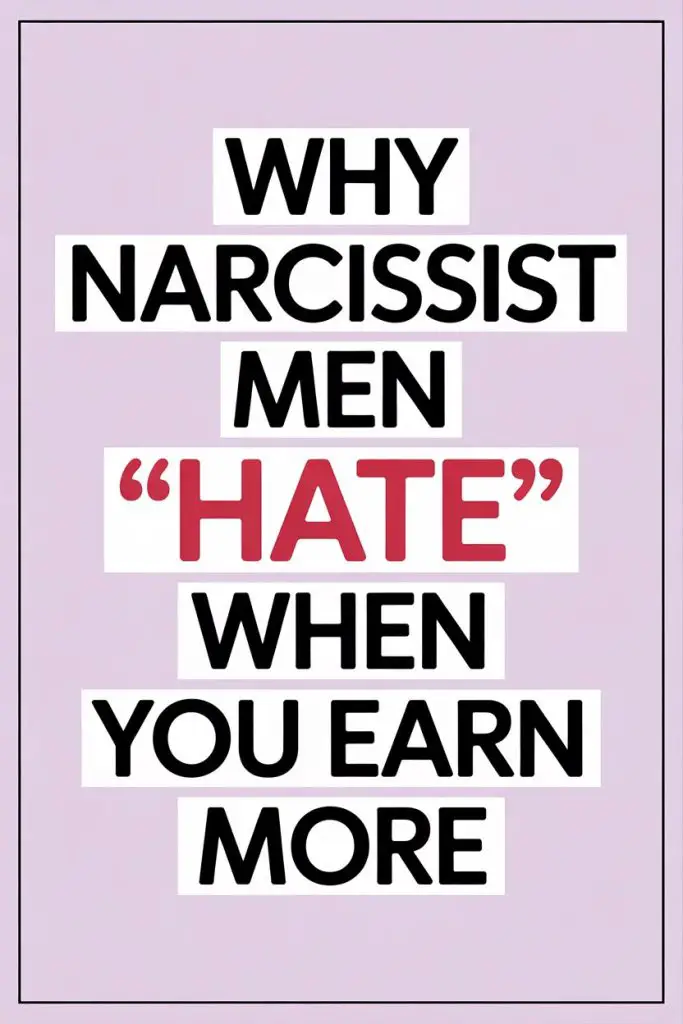Money makes the world go ‘round, sure—but in some relationships, it can also make the whole thing tilt right off its axis.
If you’ve ever seen a man squirm over his partner’s big promotion or side-eyed your own pay raise with a hint of guilt, there’s a good chance you’re rubbing up against good old-fashioned narcissistic insecurity.
When the paycheck starts tipping in your favor, narcissist men don’t just notice—they bristle.
Why does your financial success threaten them so deeply? Pull up a chair—no, really, you’ll want to sit for this one.
The Ego Has Landed
Narcissist men often wrap their identities around being “the provider.” It’s not just about paying the rent or footing the bill at dinner.
For them, money is proof of status, masculinity, and their place at the top of the relationship food chain. When you outearn them, it’s as if you’ve snatched away their superhero cape and left them in yesterday’s pajamas.
A healthy partner sees your success as your shared win. A narcissist sees it as a personal loss. In their minds, your bigger paycheck puts a dent in their manhood—and that’s something they’re not keen to admit.
The Power Play Shifts
Control is a narc’s favorite hobby, just above self-admiration and mirror-polishing. As long as they earn more, they get to call the shots—what you spend, where you go, whether you buy oat milk or stick with the boring stuff.
Your financial independence? That’s a direct threat to their power.
Suddenly you don’t need permission for that spa day or to upgrade your phone. Independence makes them nervous because it chips away at their ability to manipulate and micromanage.
It’s hard to guilt-trip someone who can just pay their own way out of the guilt.
Status Games and Social Masks
Narcissists thrive on how other people see them. They want to be envied, respected, or at least quietly admired at the barbecue.
If you start earning more, that carefully constructed image takes a hit. Cue the awkward jokes and passive-aggressive comments at family gatherings.
There’s a certain type of guy who’d rather swallow a sock than admit his wife or girlfriend is out-earning him. Not because he minds the extra cash—but because he fears what his mates will say, or what it “looks like.”
This is old-school insecurity, passed down alongside the family barbecue tongs.
Envy and Competition, Not Companionship
While a supportive partner cheers you on, a narcissist often resents your wins—even if they pretend otherwise.
Instead of celebrating your new job, he might downplay it (“That industry’s all luck anyway”), act “jokingly” annoyed about your hours, or pick a fight when you’re out celebrating. Underneath, it’s envy dressed up as concern.
Relationships with narcissists often feel less like a team sport and more like a low-budget reality show: “Who’s On Top This Week?” No surprise, they’re not thrilled when the scoreboard tips your way.
The Myth of the Threatened Masculinity
If you earn more, does it really make him “less of a man”? Rationally, no. But narcissism isn’t built on logic. It’s a house of cards held together by fragile self-worth.
These men tie their masculinity to external markers: the car they drive, the watch they flash, and yes, the zeros on their payslip. When you outearn them, the fantasy wobbles.
Instead of recalibrating their self-worth, they double down on resentment.
Control Tactics Ramp Up
Once the power dynamic shifts, narcissists often try to snatch it back. Maybe they question your spending (“Do you really need another pair of shoes?”), criticize your work schedule, or stir up guilt about time away from home.
Sometimes, they’ll pick at your self-esteem just enough to make you second-guess your success. “Are you sure you’re cut out for that job?” “I just worry you’re working too hard, babe.”
The words drip with faux concern, but the motive is always control.
Emotional Withholding and Silent Treatment
Narcissists are not above pouting—sometimes for days. If you’re feeling proud of your latest win and he suddenly grows distant, it’s not because he’s “just tired.”
Withholding affection is a classic tactic to punish you for stepping out of your lane.
Emotional coldness becomes a way to reassert dominance without saying a word. You start to wonder if you should feel guilty for your success. That’s the plan.
Undermining Your Ambitions
When encouragement is replaced with snark, there’s a reason.
Narcissists may belittle your achievements or point out every possible flaw: “Well, they only hired you because they needed a diversity hire.” “Let’s see how long you last before you burn out.”
The aim is to make you question whether your ambitions are worth it. If they can’t out-earn you, they’ll try to convince you that your success doesn’t matter—or worse, that it’s harmful to the relationship.
Gaslighting About Gender Roles
Ever heard, “Men should be the providers,” or “It just feels unnatural when the woman makes more”? Narcissists are experts at weaponizing outdated gender roles.
These dusty ideas get dusted off whenever their ego needs protection.
They might not come straight out and say it, but the hints will pile up: little jokes, loaded silences, the odd “I guess I’ll just stay home and bake cookies” quip.
It’s all a way to shame you into stepping back, so things feel “right” again (by which they mean: right for them).
Sabotage in Disguise
Once you start shining, a narcissist may actively (or sneakily) try to dim your light. Perhaps he “forgets” to watch the kids when you have a big meeting.
Maybe he creates drama the night before your presentation. It could be little things—a cold shoulder before your work dinner, a guilt trip about your late nights.
These aren’t coincidences. They’re attempts to make your work life harder, hoping you’ll decide it’s easier just to earn less and go back to the old dynamic.
Say Goodbye to Teamwork
Healthy relationships are partnerships. Narcissists, on the other hand, prefer solo acts with an adoring audience. When you start outperforming them, they don’t recalibrate—they retreat.
Instead of working together on budgets, goals, and dreams, they isolate themselves or, worse, try to isolate you. The “us” becomes “me vs. you,” with an invisible scoreboard tracking every win and loss.
What Can You Do About It Tonight?
Spotting these patterns is the first step, but here’s where the rubber meets the road. If your partner bristles at your success, it’s not your job to shrink yourself to protect his ego. Your accomplishments are not crimes.
Open a conversation—gently, but firmly. “I’ve noticed you seem uncomfortable about my job. Should we talk about what this means for us?”
Set boundaries around money, time, and respect. Joint finances can work, but only when both parties respect each other’s contributions (no matter who made what). Make sure your independence is non-negotiable.
If sabotage, belittling, or emotional withdrawal become regular features, you have every right to call them out—and to demand better.
A bit of humor helps, too. Nothing throws a narcissist off like someone who isn’t intimidated by their sulks and silences. A well-timed, “Well, someone’s got to keep the lights on!” may do wonders for your spirit, even if it makes him huff.
Choosing Your Own Worth Over His Ego
Money is neither the root of all evil nor the glue that holds a relationship together. It’s just numbers, but the meaning you attach to it? That’s where love, resentment, or rivalry sneak in.
Narcissist men hate when you earn more because it threatens the house of cards propping up their self-image, their control, and their warped sense of masculinity. That’s not your burden to carry.
Give yourself permission to celebrate your wins, with or without his applause.
If you’re with a partner who requires you to dim your shine to keep the peace, it’s time to ask yourself: Is this the partnership you deserve, or is it just a starring role in his one-man show?
At the end of a long day, your paycheck is a reflection of your hard work and talent. Anyone who can’t cheer for you—loudly and often—might just be showing you it’s time to invest elsewhere.


